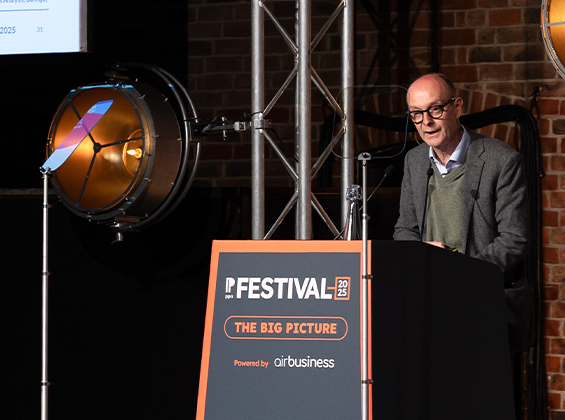
NEW ENDERS REPORT – Consumers, creators, and brands: Rewriting the media playbook
Publishers should focus on trust, usefulness and community and avoid trap of chasing consumer behaviours, says new Enders report
Industry News
Industry News
Winners of: Best Response to COVID-19 Award, Campaign of the Year, PPA Innovation of the Year, Team of the Year
When the UK went into lockdown in March 2020, The Big Issue faced a fight or flight moment. Overnight, people vanished from the High Street, vendors lost their route to sales, and 75% of the title’s income disappeared.
Despite early proclamations from Prime Minister Boris Johnson that the tide could be turned on the virus within 12 weeks, it soon became apparent that the situation was not going to end at any time soon. Looking at the forward cashflow situation, this had stark repercussions for the future of The Big Issue. Paul Cheal – who is now Group CEO but at the time was only working for the organisation for two days a week – alongside the senior management team, faced a choice.
“We were in a situation where we could galvanise or we could mothball things. My natural instinct was for the former,” he says.
While the pandemic presented its own particular crisis, it also exacerbated and accelerated many of the underlying challenges facing the business, such as declining footfall on the High Street, the move to a cashless society and the growth of media consumption across digital platforms. It was clear, therefore, that the circumstances required not just a shift in thinking, but a fundamental recalibration of The Big Issue’s publishing strategy – an urgent remodelling to secure the magazine’s immediate and future viability.
Working closely with the editorial, commercial and marketing heads on the magazine’s senior management team (SMT), and also with the board of the overarching Big Issue Group, Paul’s role was to crystallise a new publishing strategy and execute it at speed, with a pressing need to build out revenue streams that would address the worsening cashflow issue.
Creating a subscription proposition – something the Big Issue had never previously offered at scale – was the first of three pillars of the strategy. The Big Issue has a cohort of regular buyers through street sales, so this was the closest proxy to the existing model and provided an immediate route to regular income via much-needed cash.
The second pillar was retail, where the title looked to secure copy allocation and build presence within supermarkets – one of the only places where consumers were still able to make real-world purchases. Marketforce provided a valuable source of contacts to approach for help. Some retailers were particularly supportive, with the Co-op choosing to waive their listing fee.
The third part of the equation was digital – an area that was already within The Big Issue’s sights. Industry contacts again stepped up to help, with Pugpig CEO Jonny Kaldor and his team providing a pro bono app in double-quick time. This not only delivered another income stream, it also provided wider exposure and an opportunity to spread The Big Issue message among a larger audience pool.
There was also promotion of the title’s consumer fundraising campaign by its celebrity supporters, which included actors Christopher Ecclestone and Daniel Mays. Founder Baron John Bird and Chairman Nigel Kershaw also led a behind-the-scenes push to leverage their contact books, raising money among trusts and corporate donors.
Activity at this time was equally focused on safeguarding the magazine’s commercial future and continuing to deliver against the brand’s core mission – the support of vulnerable vendors – which is an important motivational force among the team. Their shared aim of helping an already vulnerable group in society took on new meaning at a time when those people were prevented from helping themselves through enforced lockdown and social distancing measures.
This provided a guiding light for staff as they pivoted rapidly to a fast-paced online publishing operation, placed into the eye of an intense period of change while adapting to the difficulties of working remotely. As such, maintaining frequent and open communication was crucial in creating the necessary cohesion and momentum among the group.
Microsoft Teams became the go-to route for team communication, ensuring everyone was aware of both the overarching strategy at play and their specific role and responsibilities at ground level. The need for a collective disciplined, focused approach was essential. Paul summarises: “There was a sense of empowerment among those people; they were clearly focused on delivering the immediate mission.”
Having put the necessary strategy and operational measures in place, the end of lockdown brought with it a sense of relief and some inevitable fatigue. With hindsight, says Paul, if it had been known that further lockdowns were on the way, even more time could have been spent on preparing for future scenarios, because just a few months later in November, lockdown unexpectedly returned. Consumer fundraising campaigns could have been dialled up earlier to capitalise on the key selling time around Christmas, reflects Paul.
The gaps in lockdowns also raised important questions around the future for subscriptions at The Big Issue, since vendors would be returning to the streets. However, Paul points out that there was a need to dismantle that thinking, not least because subscriptions provide the title with the national coverage that it isn’t able to achieve through the vendor network alone.
The challenge, therefore, was how to offer access via subscriptions while still maintaining the connection between the buyers and the vendors, who are often known figures within their communities. The answer was creating a digital vendor map, which provides a profile of sellers in their various locations and enables people to take out a ‘personal’ subscription.
As with all such developments The Big Issue has implemented in response to the unique difficulties it faced during the pandemic, Paul says it highlights the importance of deciding on a plan, but also demonstrating flexibility to ensure momentum is maintained in uncertain circumstances. “The key lesson from these emerging situations is to test and try new things, but not to overly reflect on things that go wrong. When you’re up against those timelines, to some extent you’ve really got to go with your gut, and you’ve got to trust the people around you to make the right decisions.”
Looking back, it’s clear the pandemic has been a catalyst for fundamental change in The Big Issue’s publishing model. What remains untouched, however, is the magazine’s sense of purpose, and, if anything, the experiences triggered by lockdown have amplified its message. Over the next five years, The Big Issue has set itself the target of positively impacting the lives of 1 million vulnerable people through campaigning and the creation of new training and income-generating opportunities.
“We’re now gravitating the team towards the long-term implications of what we’ve achieved for the business,” says Paul. “Our trademark behaviours are about being collaborative, determined and adaptive. And it’s about fusing those day-to-day behaviours with the bigger picture that you want to achieve.”

Publishers should focus on trust, usefulness and community and avoid trap of chasing consumer behaviours, says new Enders report

The PLS Conference 2025 brings together leading voices in publishing, who will be exhibiting and hosting an expert-led session.
Chancery House, 53-64 Chancery Lane, London WC2A 1QS




If you have a member login, enter your details below. Please note, that your login is for PPA.co.uk only and not for our event sites.
If you are a member but don’t have an account yet, you can setup your account here.
Any problems, please contact membership@ppa.co.uk.